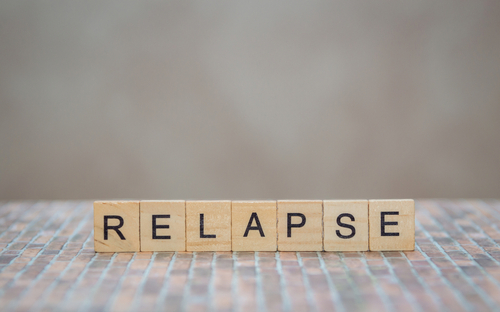If you’re in recovery, you need to have an emergency plan for situations where you’re at risk of relapse.
There’s no shame in having an emergency plan. It doesn’t mean you’re giving up before you start. It only means you are prepared to take action in the event of a relapse. Being prepared is always better than not being prepared.
It’s more common than not to relapse at least once—up to 60% of people who get treatment for substance use disorders relapse within 12 months. For many people, relapse is part of the process.
Relapse happens in 3 stages:
- Emotional relapse, in which you feel like you want to relapse.
- Mental relapse, in which you start rationalizing reasons why it’s “okay” to relapse.
- Physical relapse, in which you stop being abstinent from drugs or alcohol.
It’s easiest to tackle relapse if you’re still in the first or second stage. However, you can still get back into recovery from a third-stage relapse.
You never know how far it may get before you realize you need to seek help, so it’s good to have a plan before you need it.
It can be too difficult to make important decisions about seeking help or protecting yourself when you’re in the middle of a relapse. When you make those decisions ahead of time, it’s easier to act if a relapse does occur.
Here’s what to do when you relapse in any stage:
What to Do During Every Stage of Relapse
During any stage of relapse, remind yourself of the 5 rules of recovery:
- Change your life: Recovery is about creating a new life where you aren’t tempted to use drugs or substances. It’s easier to stay clean in a new situation because you will be less likely to think about using.
- Be honest: Know how to tell when you’re relapsing or at risk. Don’t shrug off telltale signs like depressive thoughts or starting to rationalize a relapse.
- Ask for help: Set your pride aside and ask for help when you think that you need it. During any stage of relapse, social support can be an enormous factor, but addiction makes it hard to ask for it.
- Practice self-care: Routines that include self-care help boost your protection against relapse. If you do relapse, getting back into those self-care routines will be the best way to recover.
- Follow the rules: Don’t try to bend the rules and use substances “just once” or on special occasions. Making exceptions to the rules makes it harder to get back on track and stay there.
These 5 rules are pillars that you can return to whenever you need a reminder of what to do. You can check your behavior against them to evaluate whether you’re meeting your recovery goals. And after a relapse, the 5 rules are a good roadmap for getting you back on track.
You can use these rules during any stage of relapse. It doesn’t matter if you haven’t used drugs yet; checking in on the 5 rules can help if you’re having intrusive thoughts about drugs.
What to Do During the First Stage of Relapse (Emotional Relapse)
You may be in the first stage of relapse if your emotions and behaviors are putting you at risk for a relapse in the near future.
This stage is emotional relapse. You haven’t used anything and you’re not even thinking about doing it, but your thoughts and feelings are moving back into old, harmful patterns.
You probably won’t know you’re in emotional relapse unless someone else points it out to you. It’s common to deny that you’re in an early stage of relapse.
If you’re in emotional relapse, you can:
- Check your self-care with HALT: This acronym stands for hungry, angry, lonely, and tired. If you find yourself showing at-risk behaviors or having problematic thoughts, check if you’re hungry, angry, lonely, or tired; and then solve the problem.
- Compare your behavior right now to your behaviors last time you relapsed: Are you neglecting food, hygiene, and sleep? Are you skipping meetings and avoiding friends? Make a conscious effort to monitor your behavior and change the actions that aren’t serving you.
In this stage of relapse, it’s important to maintain your social circle or community connections, whether it’s family or an Alcoholics Anonymous group. If you’re already isolating, make an effort to reach out. If you don’t have a group, find one. Community (or a lack of it) has a huge impact on relapse risk.
It’s also important to monitor your self-care and change the way you’re living, which is the only way you can change the way you’re feeling.
What to Do During the Second Stage of Relapse (Mental Relapse)
The second stage is mental relapse. In this stage, there’s an internal struggle between wanting to use and knowing that you should avoid relapse.
You may be in mental relapse if you find yourself:
- Thinking about people you used with or places where you used
- Thinking about situations where using might be acceptable (like vacation or as a once-a-year exception)
- Thinking about ways to keep drug and alcohol use a secret
If you’re in mental relapse, you’re at a high risk for physical relapse. If you think you’re in mental relapse, the best action is to start therapy. If you’re already in therapy, talk to your therapist about your thoughts.
Cognitive-behavioral therapy (CBT) is the best form of therapy for this stage of relapse. With therapy, you can lessen the risk that this will progress to a full-blown relapse.
The best ways to get therapy include:
- Starting outpatient treatment: CBT is a mainstay of most outpatient treatment programs. You don’t have to be in active physical relapse to get treatment. In fact, starting treatment in an early stage of relapse can give you a better prognosis.
- Going to inpatient treatment: Most inpatient programs use CBT as well. These programs offer more supervision and structure for people who need that extra support. If you’re high risk or have a history of relapse, consider inpatient.
- Getting a referral to a therapist from your doctor: You can get therapy without going to treatment. Talk to your family doctor, who can provide you with a therapy referral. For the best results, look for a therapist who has experience in substance use disorders (SUD).
What to Do During the Third Stage of Relapse (Physical Relapse)
If you’re in the third stage of relapse, or physical relapse, then the relapse isn’t theoretical anymore. Instead of struggling with your emotions or thinking about relapse, you’ve actually used drugs or alcohol.
When you’ve relapsed, even a single instance of substance use can lead to a cascade of thoughts about drinking or drug use. These thoughts lead to cravings, which lead to repeated use.
You can avoid relapse turning into long-term use by going to inpatient or residential treatment.
Inpatient and residential treatment programs have a few commonalities, including:
- Long-term treatment that’s at least 30 days, with 90+ days preferred
- Evidence-based treatment such as CBT or medication-assisted treatment (MAT)
- Live-in treatment where you stay in the facility 24/7 during the duration of the program
- Structure and support in the form of group programs and staff who are experienced in addiction
The biggest difference is that inpatient programs are more structured and supervised, while residential programs are more relaxed and give you freedom in how you spend your day. A residential program may be in a homelike environment, while inpatient programs are in facilities or hospitals.
If inpatient or residential treatment isn’t an option under your circumstances, you can try outpatient instead. With outpatient, you attend part-time appointments daily or a few times a week. This allows you to keep working, going to school, or caring for your family.
It’s important to get treatment if you’ve relapsed. The sooner you get help, the more quickly you can recover without falling too far into old patterns.
Relapse is a Learning Experience
At every stage of relapse, you should remember that relapse is a learning experience. When you can control your viewpoint and see relapse as an opportunity to improve, then you can respond to relapse more effectively instead of spiraling.
The majority of people who go to treatment for addiction have a relapse at some point. If you’re less than 12 months out of your last treatment stint, you’re at increased risk.
Instead of assuming you won’t relapse, put a plan into place in case you do. No one wants to have a house fire, but we use fire alarms and have a plan to get out anyway. Plan how you’ll recognize a relapse and what you’ll do to stop it.
With the right approach, relapse can be a blip instead of a massive obstacle. Now that you have a plan, you know how to protect your recovery if you ever need it.
Sources:
- Why Do Alcoholics and Addicts Relapse So Often?
- 7 Strategies to Help You Recover from a Relapse
- Focus: Addiction: Relapse Prevention and the Five Rules of Recovery
- How to Avoid Another Alcohol Relapse


